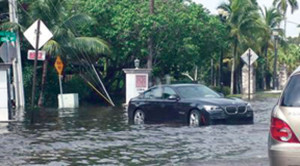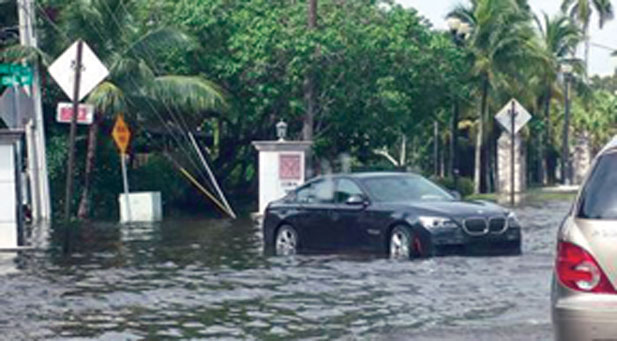 Ready for floods? Florida gets ‘F’, California gets ‘A’
Ready for floods? Florida gets ‘F’, California gets ‘A’
By Audrey Peterman
After I sent in my column to the Westside Gazette last week, “South Florida flooding will make Katrina conditions a walk in the park,” I felt a little anxious. Why should anyone believe something so dire is on the horizon when they’re not hearing about it elsewhere or involved in preparing for it?
So I was relieved when I woke up Thursday morning, the day after the paper hit the newsstands, and saw this headline in the Sun-Sentinel: “Florida flood preparations slammed in national report.”
According to the Sun-Sentinel, “The study, called States at Risk, says Florida lacks a long-term plan for dealing with rising sea levels, despite being the nation’s most vulnerable state as oceans inch higher…. Florida earns an F for its average level of preparedness in the face of a far-above-average coastal flooding threat…”
Our state gets an overall grade of “F” in dealing with the issue that is projected to overwhelm us by 2030. California got an “A.”
What is the difference between California and Florida? Why would we settle for so much less?
I found this part of the Sun-Sentinel’s story curious: “Contrary to the state, the four counties of southeast Florida have undertaken extensive preparations for climate change. Members of the Southeast Florida Regional Climate Change Compact, which consists of Broward, Palm Beach, Miami-Dade and Monroe counties, held a news conference Wednesday at Flor-ida Atlantic University to discuss the report. Although they largely concurred with the conclusions, they said it appeared to have ignored work by the state’s water management districts in preparing for sea-level rise, as well as the extensive work being done in South Florida at the city and county levels to adapt to high sea levels.”
Really? First of all, “Measures we take to improve coastal resilience in an equitable way must be informed by a robust, inclusive process of stakeholder engagement.” In other words, the people have to be informed and be involved in the decisions.
This is one of the key recommendations in the new report from the Union of Concerned Scientists, “Surviving and Thriving in the Face of Rising Seas,” which also landed in my mailbox the same day. This re-port focuses on the effects of climate change on poor and Black communities that are on the frontlines in places like Louisiana and Florida. It provides a “Climate Equity Tool” to assess and plan to meet their needs ahead of time.
I’m confused as to who is responsible for planning and coordinating the huge response required. Perplexingly, I got an invitation from the South Florida Regional Council to a “Climate Leadership Summit” at the Casa Marina Resort in Key West Dec. 1-3. This council is being led by the same people who were formerly the South Florida Regional PLANNING Council. When and why have they deliberately removed the word PLANNING from their title? If they’re no longer doing the planning, who is?
I found the Compact’s apparent reliance on the state’s water management districts disturbing, because what we are talking about fundamentally is the re-ordering of the physical space where we live. So we need a Plan that enables the District and the development and business community to work together and determine where and what is going to be built. Development can either help hold back the water or intensify the crisis by putting more people in places we know are going to flood. We need the education sector on board to provide us with more environmental scientists and mitigation experts. We need local governments to organize and educate their constituents about conservation and we need to provide more efficient and accessible transportation alternatives that we encourage people to use.
Given the mental imbalance shown by our governor who forbade state employees to use the words “climate change” (as if that would stop the forces of nature!) it is up to Floridians to educate ourselves if we care about our own safety and want to move from “F” to “A”
Educate yourself if you care, and then take appropriate action as part of the constituency of our country. Or we could just wait, and hope.
(Audrey Peterman is an environmentalist and writer living in Fort Lauderdale. WWW.earthwiseproductionsinc.com)

